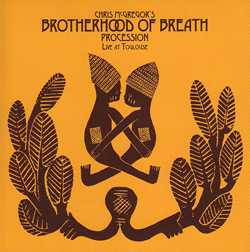
The story of The Blue Notes — pianist Chris McGregor, tenor saxophonist Nik Moyake, alto saxophonist Dudu Pukwana, trumpeter Mongezi Feza, bassist Johnny Dyani and drummer Louis Moholo-Moholo — is one of the more remarkable in jazz. Their 1964 flight from the oppression of apartheid in their native South Africa and their journey across Europe until they arrived in Britain (except for Moyake who returned to South Africa and died there in 1969) has become the stuff of myth. In London, the five bonded with members of the burgeoning free jazz and improv community, eventually leading to the formation of Brotherhood of Breath. This large ensemble had a line-up of variable size and personnel which integrated the South Africans with London-based players such as Elton Dean, Mike Osborne, Evan Parker and John Surman, in a heady mixture.
Recorded in concert in May 1977, Procession — Live at Toulouse has been a perennial favourite since its vinyl release in 1978. Now, not only is it available on CD for the first time but this release has added three unreleased tracks to the LP's three as well as four extra minutes to one of those original three — a total increase in playing time of almost twenty-three minutes. Irrespective of the quantity of music here, it is impossible to dispute its quality; Brotherhood of Breath produced some of the most infectiously exuberant jazz ever recorded, making any addition to the band's discography very welcome. This incarnation of the band was eleven-strong, including Osborne and Parker plus trombonist Radu Malfatti, South African Harry Miller on second bass and trumpeters Harry Beckett and Marc Charig. Sadly, Mongezi Feza had died of pneumonia in late 1975, aged 30; the early deaths of Blue Notes' members are the sadder side of their story. (Of the original six, thankfully Moholo-Moholo is still thriving.) Long after Feza's death, his comrades continued to play his compositions, and fine versions of "You Ain't Gonna Know Me 'Cos You Think You Know Me" and "Sonia" are included here.
The combination of seven wind instruments with four in the rhythm section gave this band great power and variety. As usual, rather than employing a conventional jazz format of head-solos-reprise, the ensemble played themes then adopted a collective criss-cross approach to improvisation, with everyone chipping-in throughout, irrespective of who was in the spotlight. Underpinning everything — adding structure and excitement to the recipe — were the infectious rhythms of South Africa, rhythms which drew every player to them, creating a band in which everyone was both a fine soloist and a rhythm player. The end results have drawn comparisons with the bands of Mingus and Sun Ra, but they don't do justice to the music, only hint at its class. Brotherhood of Breath always produced a most joyful noise — one not to be missed.
Comments and Feedback:
|



